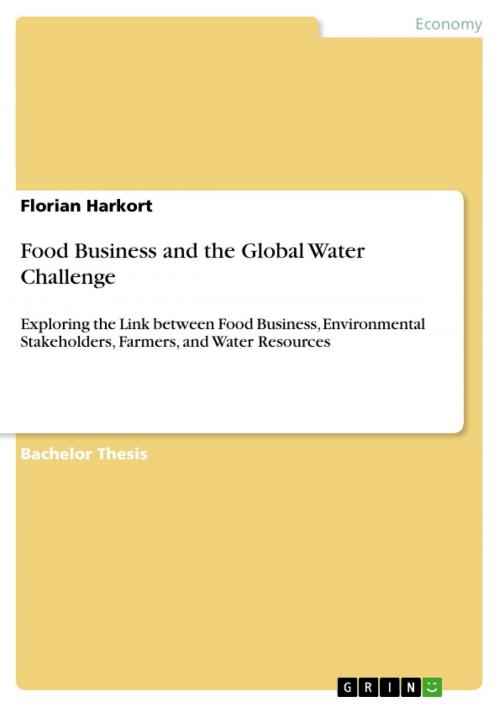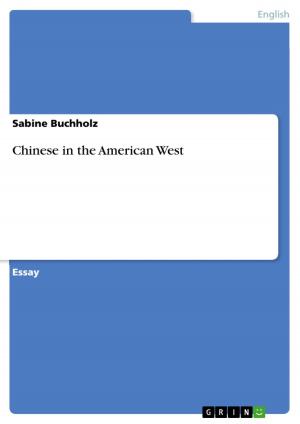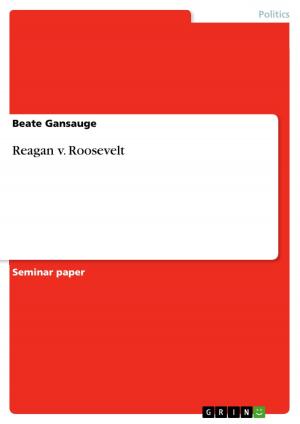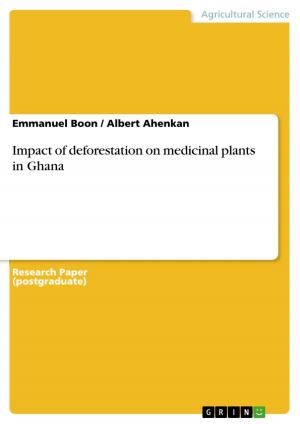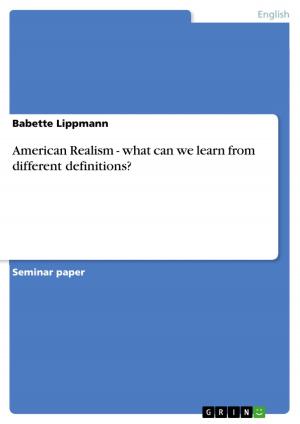Food Business and the Global Water Challenge
Exploring the Link between Food Business, Environmental Stakeholders, Farmers, and Water Resources
Business & Finance, Business Reference, Business Ethics| Author: | Florian Harkort | ISBN: | 9783640459230 |
| Publisher: | GRIN Publishing | Publication: | October 28, 2009 |
| Imprint: | GRIN Publishing | Language: | English |
| Author: | Florian Harkort |
| ISBN: | 9783640459230 |
| Publisher: | GRIN Publishing |
| Publication: | October 28, 2009 |
| Imprint: | GRIN Publishing |
| Language: | English |
Bachelor Thesis from the year 2008 in the subject Business economics - Business Ethics, Corporate Ethics, grade: 1,7, University of Hohenheim (Institut für Agrarpolitik und Landwirtschaftliche Marktlehre), course: Management in der Ernährungswirtschaft, language: English, abstract: In many ways water is of vital importance for humanity. But 1.1 billion people in developing countries today have inadequate access to water. While competition for water increases worldwide, agriculture - the major user of water - is challenged to manage water in a more efficient and environmentally sustainable way. Meanwhile, the governance of the global agri-food system is undergoing significant changes, thus altering business relationships. These altered business relationships raise questions about the impact of food business on water resources. The central research question of this paper, applied to developing countries, is: Does food business satisfy the interests of Environmental Special-Interest Groups and farmers in efficient and environmentally sustainable agricultural water management, as well as the interests in the related arrangements of relationships? Drawing on stakeholder theory, the relationships between food business, environmental stakeholders, farmers, and water resources are explored. By transferring the key principles of value creation, dialog, and continuous improvement on food business, critical factors were identified. Value creation, inclusiveness, and accountability are crucial features of relationships with environmental stakeholders, while value creation, fairness, support and compliance are crucial features of relationships with farmers. Two case studies, focusing on Nestlé and GlobalGAP, were undertaken. The study concludes that food business increasingly acknowledges the vital importance of addressing water management in agriculture. The case studies provided a few promising approaches to satisfy the interests of environmental stakeholders and farmers. Further research must be conducted, in order to assess the particular implications for smallholders. In addition, more transparency is generally needed, to make the effective impact of food business on water resources in global agriculture measurable. -- Keywords: Water resources, irrigation, food industry, food trade, csr, corporate social responsibility, business ethics, green business, stakeholder dialogue, supply chain, procurement, stakeholder management / Schlagworte: Bewässerung, Nachhaltigkeit, Unternehmensethik, Wirtschaftsethik, Ethik, Verantwortung, Stakeholderansatz, Stakeholderdialog, Anspruchsgruppen, Lebensmittelindustrie, Nahrungsmittelindustrie, Lebensmitteleinzelhandel, Lebensmittelhandel, Handel, Konsumgüter, Supermarkt, Lieferkette, Beschaffung.
Bachelor Thesis from the year 2008 in the subject Business economics - Business Ethics, Corporate Ethics, grade: 1,7, University of Hohenheim (Institut für Agrarpolitik und Landwirtschaftliche Marktlehre), course: Management in der Ernährungswirtschaft, language: English, abstract: In many ways water is of vital importance for humanity. But 1.1 billion people in developing countries today have inadequate access to water. While competition for water increases worldwide, agriculture - the major user of water - is challenged to manage water in a more efficient and environmentally sustainable way. Meanwhile, the governance of the global agri-food system is undergoing significant changes, thus altering business relationships. These altered business relationships raise questions about the impact of food business on water resources. The central research question of this paper, applied to developing countries, is: Does food business satisfy the interests of Environmental Special-Interest Groups and farmers in efficient and environmentally sustainable agricultural water management, as well as the interests in the related arrangements of relationships? Drawing on stakeholder theory, the relationships between food business, environmental stakeholders, farmers, and water resources are explored. By transferring the key principles of value creation, dialog, and continuous improvement on food business, critical factors were identified. Value creation, inclusiveness, and accountability are crucial features of relationships with environmental stakeholders, while value creation, fairness, support and compliance are crucial features of relationships with farmers. Two case studies, focusing on Nestlé and GlobalGAP, were undertaken. The study concludes that food business increasingly acknowledges the vital importance of addressing water management in agriculture. The case studies provided a few promising approaches to satisfy the interests of environmental stakeholders and farmers. Further research must be conducted, in order to assess the particular implications for smallholders. In addition, more transparency is generally needed, to make the effective impact of food business on water resources in global agriculture measurable. -- Keywords: Water resources, irrigation, food industry, food trade, csr, corporate social responsibility, business ethics, green business, stakeholder dialogue, supply chain, procurement, stakeholder management / Schlagworte: Bewässerung, Nachhaltigkeit, Unternehmensethik, Wirtschaftsethik, Ethik, Verantwortung, Stakeholderansatz, Stakeholderdialog, Anspruchsgruppen, Lebensmittelindustrie, Nahrungsmittelindustrie, Lebensmitteleinzelhandel, Lebensmittelhandel, Handel, Konsumgüter, Supermarkt, Lieferkette, Beschaffung.
